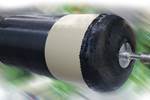NASA white paper evaluates thermoplastic polyimide for electrical insulation applications
SAMPE technical paper reveals testing done on plastics company BARplast’s Aurum polymer, supported with fiberglass, to evaluate its insulation capabilities for future electrical aeroengines.
Plastics fabrication company BARplast (Houston, Texas, U.S.), a subsidiary of high-performance plastics distributor Bieglo Group (Hamburg, Germany), has released a white paper published by NASA and presented at the SAMPE North America conference in May 2024. The conducted research, as described in the white paper, studied BARplast’s thermoplastic polyimide, Aurum.
NASA’s Glenn Research Center in Cleveland, Ohio, tested the thermoplastic polyimide (TP PI), finding it be a candidate for the insulation of electrical wiring used in future aerospace engine technologies. The goal of the researcher’s work was to “develop and characterize high operating temperature, melt processable and thermally conductive thermoplastic electrical insulation materials systems to improve thermal management in high power density electric motors.” Most electrical wiring requirements necessitate continuous operation temperature of up to 200°C.
In the study TP PI with up to 25 wt% micro-hexagonal boron nitride (micro-hBN) were compounded and injection molded. Fiberglass reinforcement was present as insulation and as a heating element applied to the TP PI. In addition, the text discusses the incorporation of hBN as a filler material within the TP PI material. While hBN is not a fiber reinforcement in the traditional sense, it is often used to enhance the thermal and mechanical properties of polymer composites, which can complement the effects of fiberglass reinforcement.
Aurum is a semicrystalline TPI suitable for powder coating, injection molding and extrusion coating. Produced by Mitsui Chemicals Inc. (Tokyo, Japan) and sold by BARplast in the U.S. and Bieglo in Europe, it is said to have one of the highest glass transition temperature (245°C) of any commercially available thermoplastic.
“A melt processable PI with high service temperatures is of interest as an electrical insulation candidate material,” the research notes in the report. “Additionally, melt processing enables facile dispersion of fillers within a polymer matrix which can impart additional functionality such as thermal conductivity…” Results concluded that TI PI are promising candidates for these kinds of applications, demonstrating good high-temperature performance.
Read the complete white paper here.

















